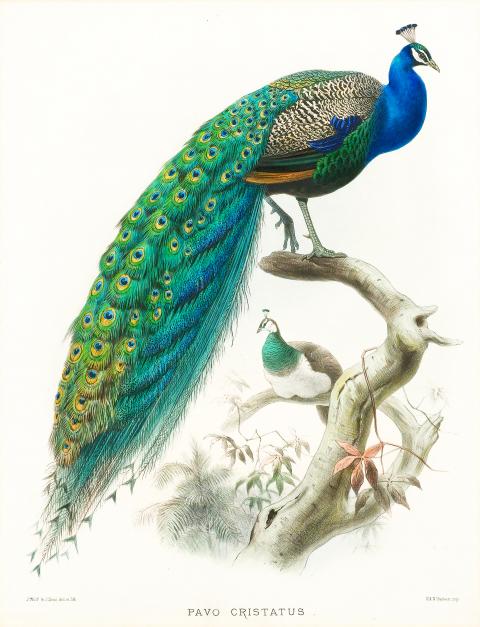Chinese Practice
目中無人
(mu4 zhong1 wu2 ren2)

Photo: Wikimedia Commons
照片:維基共享資源
to consider everyone else beneath you
英文中有個習語「have one’s nose in the air」,字面意義為某人把鼻子挺得高高的。若有人把頭抬高、仰起下巴、鼻尖凸出、用鼻孔對著人,就會給人一種自視甚高、目中無人的高傲的感覺。
成語「目中無人」——眼中沒有他人,只有自己——即是用來形容人高傲自大、瞧不起別人。此語出自明末小說家凌濛初〈西元一五八○~一六四四年〉的《初刻拍案驚奇》卷一三的一個故事:有一對夫婦老來得子,因此對這寶貝兒子非常溺愛,兒子想要什麼,老夫婦一定會千方百計想辦法弄來。結果,兒子反而給慣壞了,長大後只會結交狐群狗黨、胡作非為,而且他目中無人,竟還對父親動粗,讓兩老傷心不已。
另外一個類似意義的成語為「目空一切」——什麼都不放在眼裡,也是形容人高傲自大。此語一般認為出自南宋政論家陳亮〈西元一一四三~一一九四年〉的〈題喻季直文編〉。文中陳亮論及他的四位朋友,其中一位朋友「目空四海,獨能降意於一世豪傑,而士亦樂親之。」(他自視甚高,什麼都不放在眼裡,但是對豪傑之士還是能壓低姿態、以禮相待,所以讀書人也很樂意跟他來往。)成語「目空一切」即是由「目空四海」所演變出來的。
我們現今口語所說的「眼睛長在頭頂上」,也大約是這個意思。另外還有一種說法「鼻孔撩天」(或作「鼻孔朝天」),也是充滿視覺形象的形容。「目中無人」、「目空一切」、「眼睛長在頭頂上」、「鼻孔撩天」等這些成語,以及英文的「have one’s nose in the air」,一個比一個生動,就像是諷刺畫般活靈活現地幾筆勾勒出這驕傲的神態。
(台北時報林俐凱)
這位影星嚐到了走紅的滋味,就開始耍大牌、目中無人,結果得罪了全劇組。
(This movie star has had a taste of success, and is now putting on airs and walking around with his nose in the air. He’s got the backs up of the whole film crew.)
有人認為,年少得志容易目空一切、恃才傲物,反而失去了許多寶貴的學習機會。
(Some say it’s easy to become full of yourself and conceited if you succeed early on, but you risk losing the opportunity to continue learning.)
英文練習
have one’s nose in the air
In English, there is a common saying that goes “to have one’s nose in the air,” which literally means to walk around with your nose held high. If somebody has their nose elevated in this manner, with their jaw lifted and the tip of their nose turned up, showing people the inside of their nostrils, it imparts an impression not only of excessive self-regard but also of an arrogance betraying a distinct disregard of others.
In Chinese, this idea — of being so arrogant you only think of yourself — is encapsulated in the idiom 目中無人. The phrase derives from a story in chapter 13 of the late Ming Dynasty collection of short stories Slapping the Table in Amazement I by Ling Mengchu (1580–1644). In the story, a couple are blessed with a child late on in life, and spoil it: Whatever the child wanted, the couple would do everything within their power to make sure that he got it. Over time, the child became accustomed to this, and when he grew up he ran with gangs and got himself into trouble. The son had complete disregard for others, and even hit his own father, to his parents great sadness.
There is another idiom, too, with a similar meaning: 目空一切, literally the inability to see anything, indicating arrogance in a person. It is generally believed that this phrase comes from the Preface to the Works of Yu Jizhi by the Southern Song Dynasty political writer Chen Liang (1143-1194). In the text, Chen discusses four friends, one of whom he describes as “being oblivious to the four seas” — 目空四海 — and of viewing himself very favorably, on a par with very capable peers, such that he could mix in the same circles as the educated elite. Over time, 目空四海 evolved into the idiom 目空一切.
A modern colloquial term with a meaning essentially the same as this is 眼睛長在頭頂上, literally “eyes growing on the top of one’s head.” Another phrase is 鼻孔撩天, sometimes written 鼻孔朝天, literally “nostrils turned up to face the heavens,” is another very visual description. These are very similar to the English phrase “have one’s nose in the air,” wittily conjuring up the image of an arrogant posture often seen in satirical drawings.
(Translated by Paul Cooper)
Look at that guy with his nose up in the air like that. Who does he think he is?
(你看那個人目中無人的樣子,他以為自己是誰呀?)
She’s always got her nose up in the air, but I don’t think she means to be arrogant. It’s just her posture.
(她總是把下巴抬得高高的,可是我覺得她並不是傲慢,只是姿勢的關係。)

Rice is essential to Japanese culture, tradition and politics. People take pride in the oval-shaped sticky Japonica grain, which is still a staple even though total consumption has fallen over the decades. But since last summer, prices have soared as supplies have fallen short of demand. The government has long paid farmers to cut back on rice acreage, and change to other crops to keep rice prices relatively high. To cope with shortfalls this year, the government has released rice reserves. But the grain has been slow to reach supermarket shelves. Anger over that was part of the reason the Agriculture Minister

Step into any corner of Turkiye, and you’ll likely encounter the iconic “Evil Eye,” known as “nazar boncu?u” in Turkish. This striking blue glass ornament is shaped like an eye with concentric circles of dark blue, white, and light blue. While its name in English suggests something threatening, it’s actually a charm designed to ward off misfortune. The origins of the nazar boncu?u can be traced back to ancient Mediterranean and Middle Eastern traditions. The word nazar comes from Arabic, meaning “gaze,” while boncu?u translates to “bead” in Turkish. Central to the nazar boncu?u’s mythology is the idea that

A: Wow, Les Miserables Staged Concert Spectacular is visiting Taiwan for the first time. B: Isn’t Les Miserables often praised as one of the world’s four greatest musicals? A: Yup. Its concert is touring Taipei from tonight to July 6, and Kaohsiung between July 10 and 27. B: The English version of the French musical, based on writer Victor Hugo’s masterpiece, has been a huge success throughout the four decades since its debut in 1985. A: The musical has never toured Taiwan, but going to the concert sounds like fun, too. A: 哇,音樂劇《悲慘世界》紀念版音樂會首度來台巡演! B: 《悲慘世界》……它不是常被譽為全球四大名劇之一嗎? A: 對啊音樂會將從今晚到7月6日在台北演出,從7月10日到27日在高雄演出。 B: 這部法文音樂劇的英文版,改編自維克多雨果的同名小說,自1985年首演以來,在過去40年造成轟動。 A:

Continued from yesterday(延續自昨日) https://www.taipeitimes.com/News/lang In 1946, the company adopted the name 7-Eleven to reflect its newly extended __3__, from 7am to 11pm, a novel concept at the time. As a rapidly growing company, it began offering franchise opportunities in the 1960s. In 1974, the first 7-Eleven in Japan was opened by the supermarket company Ito-Yokado. The Japanese franchises were __4__ successful that by 1991, Ito-Yokado was able to acquire a 70 percent stake in Southland Corporation. Its investments eventually resulted in full ownership of 7-Eleven, which paved the way for the Japanese company to enter the international market. Since then, 7-Eleven